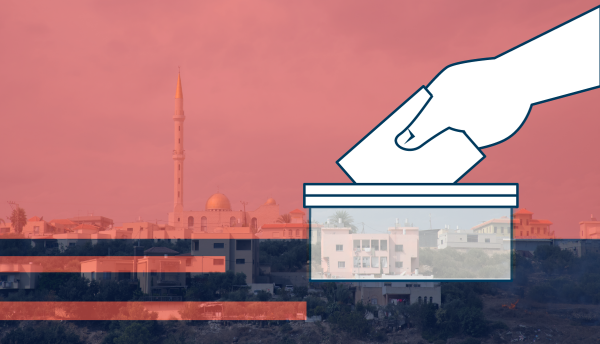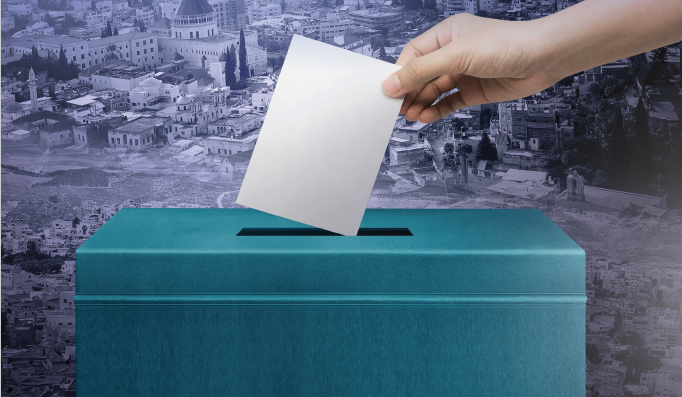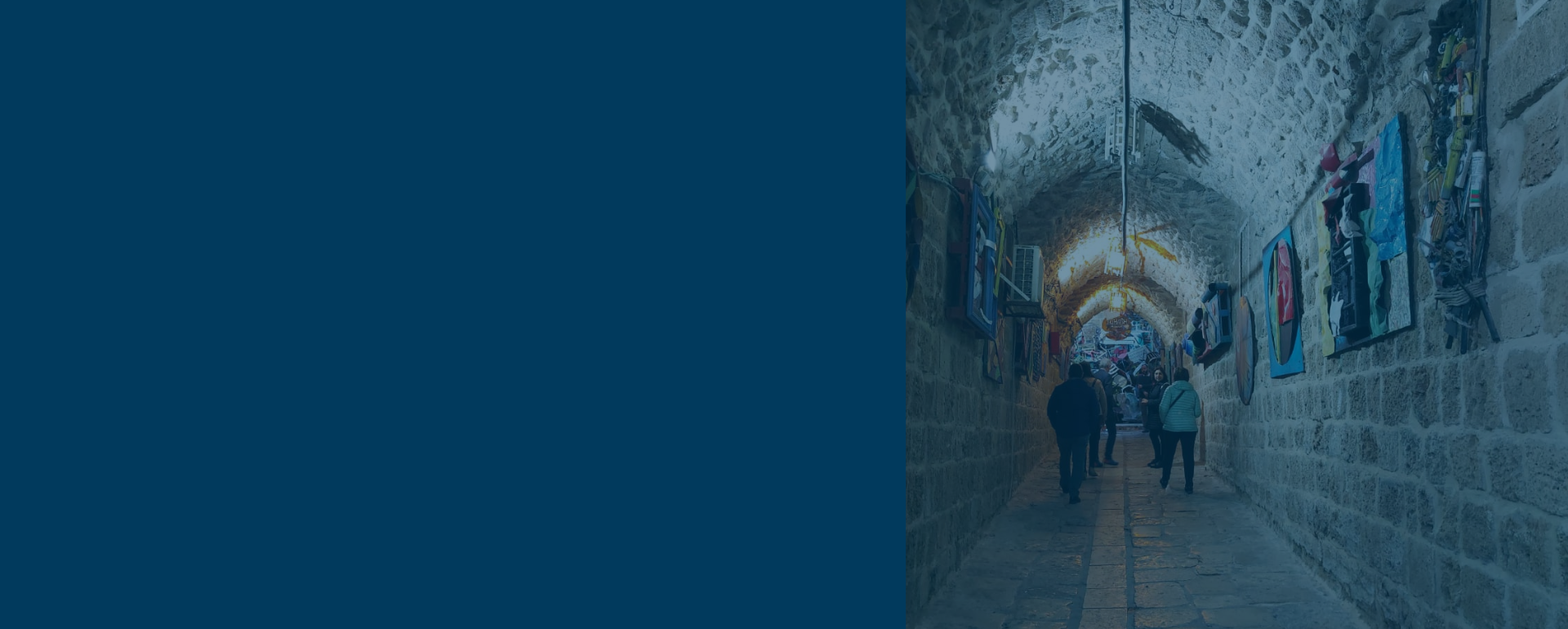
- 2024 Israeli Municipal Elections took place on February 27, 2024.
- Arab local election turnout saw a slight dip to 76%, but remained well above the national average of 49%.
- Two notable trends emerge in these elections: the decline of the national Arab parties and the weakening influence of prominent families in local governance.
- 50% of elected mayors 30 out of 66, are new faces, including six with prior experience.
- Elections in 15 municipalities proceed to a second round due to no candidate securing over 40% of votes.
- Despite low overall Arab representation in city councils and municipal roles, major mixed cities show a positive trend, with increased success for Arab candidates.
- The representation of women in Arab councils increased to twenty members securing positions this year, compared to sixteen in the previous round.
- Crime and budget cuts for socio-economic development remain the primary challenges for the Arab local authorities.
Municipal elections in Israel, initially set for October 31st, 2023, were postponed twice due to the war, eventually taking place on February 27, 2024. While Arab communities typically witness exceptionally high local election turnout ranging between 85-90%, this year experienced a slight decline with a turnout of 76%, still surpassing the national average of 49%. The decline is attributed to widespread apathy in Israel, coupled with concerns about personal security and the profound sorrow within the Arab community stemming from the conflict in Gaza.
Held every five years, the municipal elections determine mayors, heads of local and regional councils, and representatives. In a year marked by unprecedented political turmoil, many elections in Israel were expected to play out as a referendum on government actions and polarization. In Arab municipalities, 30 out of 66 elected mayors successfully unseated the incumbent, marking a significant turnover. Most are newcomers, with six having previous experience in the role. In 15 localities, the elections will advance to a second round as no candidate managed to secure over 40% of the votes. The upcoming round is scheduled for March 10, the eve of Ramadan.
Local politics has often been “the sole organizational framework and channel to advance political, social, and economic development” and serves as the most prominent and accessible layer of government, services, and resources for most Arab citizens. Two notable trends emerge in these elections: the decline of the national Arab parties and the weakening influence of prominent families in local governance. According to Imad Jaraisy, CEO of Injaz, “candidates from the national parties either failed or won by a narrow margin. Representation of political parties on councils also declined. The Arab society understood that the parties are less relevant for local governance and preferred pragmatic candidates.” Ameer Bisharat, CEO of the Committee of Mayors, adds: “there is a trend of mayors not affiliated with the large families. There is a new spirit in the local authorities. There is a lot of work to be done with so many new mayors, especially given the current government and the need to lead many struggles”.
In recent years, as government budgets for Arab socio-economic development grew, so have efforts to attract mission-driven candidates who would be capable of managing development budgets and projects for their towns. Following the 2024 local elections, however, the elected leaders face pressing challenges, including personal security issues, institutional inequality, and the encroachment of criminal organizations.
Mixed Cities
Local politics wield significant influence on intergroup relations in mixed cities, shaping resource distribution, investments, and setting the tone for Jewish-Arab relations. Increasing Arab representation on local councils has long been recognized as a key way to address community needs, foster trust, and advance a shared city vision. While overall Arab representation on city councils and in professional municipal roles remains low, the number of successful Arab candidates increased in major mixed cities this year. In Nof HaGalil, the Jewish-Arab party is the second-largest, with four members in the city council. In Haifa, there are now four Arab council members, compared to two in the previous council, including two from Hadash, one from Balad, and one from Rov HaIr – the Jewish-Arab party. In Tel Aviv-Jaffa, Kulanu HaIr (Heb. We All are the City) won 3 seats in the council. Shutafut (Heb. Partnership), the first Arab-Jewish partnership in Beer Sheva’s city council, serving the whole population in the Negev, did not succeed in the elections.
Since the violent clashes of May 2021, intercommunal relations in mixed cities remain tense. In the lead-up to the original date for local elections, mixed cities witnessed struggle for control of local authorities, marked by anti-Arab rhetoric of extreme right-wing campaigns, and joint Arab-Jewish lists advocating a shared future. Following October 07, the situation intensified, with right-wing parties exploiting fears in cities like Ramle in their promise to “deal with the Arabs.”
To address challenges, political parties and civil society supported Arab candidates, joint Arab lists, and Jewish-Arab partnerships for local councils. The Abraham Initiatives’ “My Vote Decides – My City Counts” national campaign specifically encouraged residents in mixed cities to demand political parties address unique city characteristics, prioritize equality, and promote shared society plans. According to Rim Hazan, the Secretary of Hadash, the Arab-Jewish political party, “joining forces is necessary in the shadow of the extremist government that sees Arab citizens as enemies, especially in the mixed cities and Haifa with its special fabric of relations between the two peoples.” This approach has shown effectiveness in various mixed cities, where extreme right-wing candidates notably failed to secure representation in the councils.
Women
Civil society and women’s organizations played a pivotal role by investing resources and initiating campaigns to support women candidates in local elections, resulting in a notable increase, with twenty women securing positions in Arab councils this year compared to sixteen in the previous elections.
“Your Voice is Power” is a coalition of women’s and rights-based organizations. Launched in 2018, they continue to advocate for increased participation of women in local councils and municipalities, to be part of decision-making processes within their communities. This year, the coalition ran a social media campaign and conducted media training workshops for female candidates and activists. “Unfortunately, the current violent reality reinforces this destructive mechanism where very few women candidates run for office” explains journalist Maqbula Nassar.
Kayan Feminist Organization held a conference in Nazareth on Electoral Culture in Arab society, featuring influential women examining Arab local authority elections and their impact on women’s rights. In the opening speech, Rania Darawsheh Keelny, an activist at “Women Leaders of Yafa an-Naseriyye”, called for a protest vote with blank ballots to highlight Arab women’s political marginalization. The Women Against Violence Association also monitored the political representation of Arab women within political parties.
Crime
In recent years, as criminal organizations’ activities in Arab communities expanded, more have targeted municipal authorities as vehicles for their interests, seeking control over governmental tenders and resources. In the lead-up to the elections multiple Arab candidates have experienced violence and threats, with at least 18 criminal incidents recorded since May 2023. These acts include shootings, vandalism, and assaults against elected officials and employees of local Arab Israeli authorities, as reported by the Emergency Headquarters for the fight against crime and violence of the National Committee of Heads of Arab Local Authorities.
Both the Shin Bet and the police were closely monitoring the elections, flagging 15-20 localities where organized crime was posing a threat. The stakeholders in the field report that the involvement of organized crime in local elections undermines the democratic voting process, depriving residents of their right to choose their representatives and fosters a sense of alienation and reduced community involvement.
Following the 2024 local elections, the elected officials are expected to deal with the continuing increase in the homicides rate in the Arab society “without any significant government action to eradicate or control the phenomenon,” warns Mder Younes, chairman of the Committee of the Heads of the Arab Local Authorities.
Prospects for Economic Development
While the impact of crime and insecurity has cast a shadow on municipal elections and Arab society, it has also spurred recurring attempts by the national government to revoke budgets designated for Arab local authorities, citing the risk of reaching criminal organizations.
On January 15 Israel’s cabinet approved proposed revisions to the 2024 state budget. Proposed cuts , NIS 1.2 B, include a 5% flat reduction across all ministries and a permanent 15% cut to twenty-four government resolutions, including all government resolutions geared towards narrowing gaps in Arab society, and promoting socio-economic growth. The budget cuts are still under discussion in the Finance Committee in the Knesset. In addition, newly elected Arab officials face the challenge of the government’s decision to withhold the promised annual transfer of 200 million NIS for the next three years.


